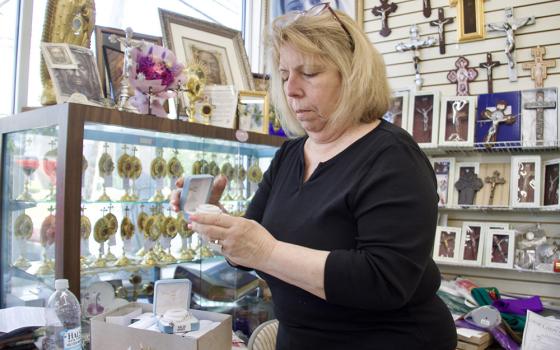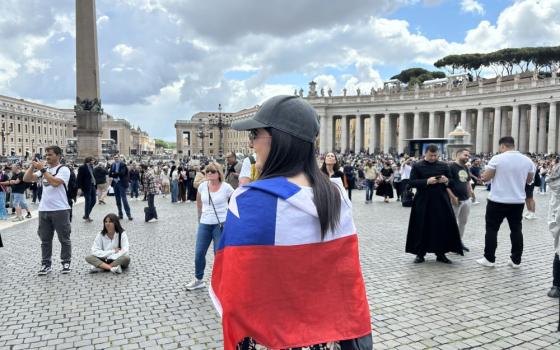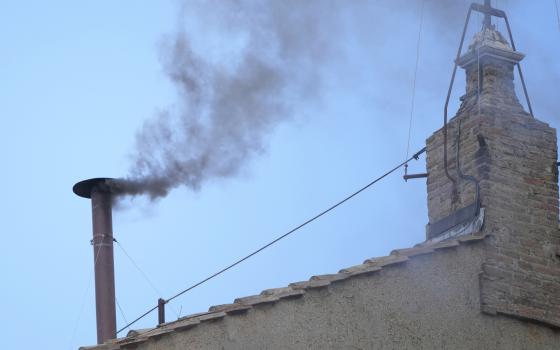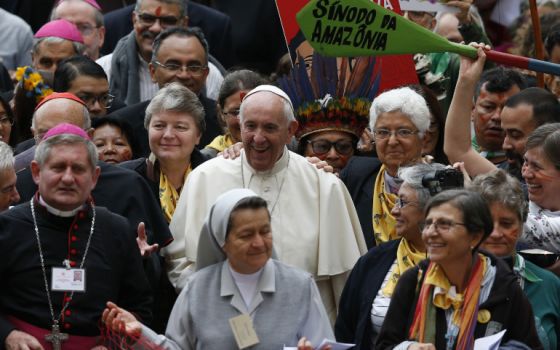
People use their phones to take photos as cardinals process into St. Peter's Basilica at the Vatican for Mass on the final day of the official mourning for Pope Francis on May 4, 2025. (CNS/Lola Gomez)
Political analogies for understanding the papal conclave are everywhere: left vs. right; liberal vs. conservative; progressive vs. traditionalist.
The New York Times called the conclave a "particularly perilous moment for a church that Francis left deeply divided, with progressive factions pushing for more inclusion and change, and conservatives seeking to roll things back, often under the guise of unity."
The Washington Post's labels were better, speaking of "the forces buffeting the church — secularism, the growth of evangelical churches — remain present even as new fault lines have opened, particularly between church traditionalists and reformists."
Still, these labels becloud more than they enlighten. They are employed because they are familiar and easy and because politics has infected virtually every nook and cranny of the culture. And, I confess, I use them sometimes too. They are almost unavoidable.
The core issue facing the church is not ideological. The core issue is the definition of catholicity. When we recite the Nicene Creed every Sunday, we Catholics state that we believe in the "one, holy, catholic and apostolic Church." Each of those adjectives has a meaning that escapes the narrow ideological confines of a left vs. right binary.
Since the time of the Reformation, many, perhaps most, Catholics construe catholicity as an adherence to a checklist of beliefs, especially moral beliefs. So-called liberal Catholics take umbrage at any failure to pursue their brand of social justice. So-called conservative Catholics cling to the church's teaching on human sexuality as especially important. Everyone, it seems, is a cafeteria Catholic of one sort or another.
Consider the piece George Weigel published in The Washington Post the day Francis died. He alleged that Pope Francis had squandered the moral witness evidenced by his predecessors, that "the pope's commentary on world affairs muddled rather than clarified the moral stakes in play." What, pray tell, was muddled about "This economy kills"?
Advertisement
Weigel and his ilk simply did not like what Francis had to say about the economy, nor the clarity with which he said it. It was the opposite of muddled and it provided precisely the kind of moral witness needed in the face of the sociocultural world created by consumer capitalism. Demanding that economic systems be measured by the justice they produce, not simply their GDP, is fully in line with Catholic social doctrine.
On the other hand, the left's prioritization of inclusivity and diversity as important cultural values can be equally distorting. In The Guardian, an article by Jude Dike asked, "Is it time for a black pope?" Dike wrote, "A Black pope would send a powerful message of inclusivity, acknowledging the growth and importance of Africa within the Catholic Church, and representing the millions of Black Catholics around the world whose voices are still often marginalized in the highest halls of power." But a Black pope would not likely extend the concept of inclusion to gay and lesbian Catholics. Geographic diversity does not necessarily track with other varieties of diversity.
The biggest problem with any ideologically driven approach to framing the issues facing the church is that they reject the most constitutive intellectual characteristic of the Catholic Church's intellectual tradition, its preference for "both/and" approaches rather than "either/or" strictures.
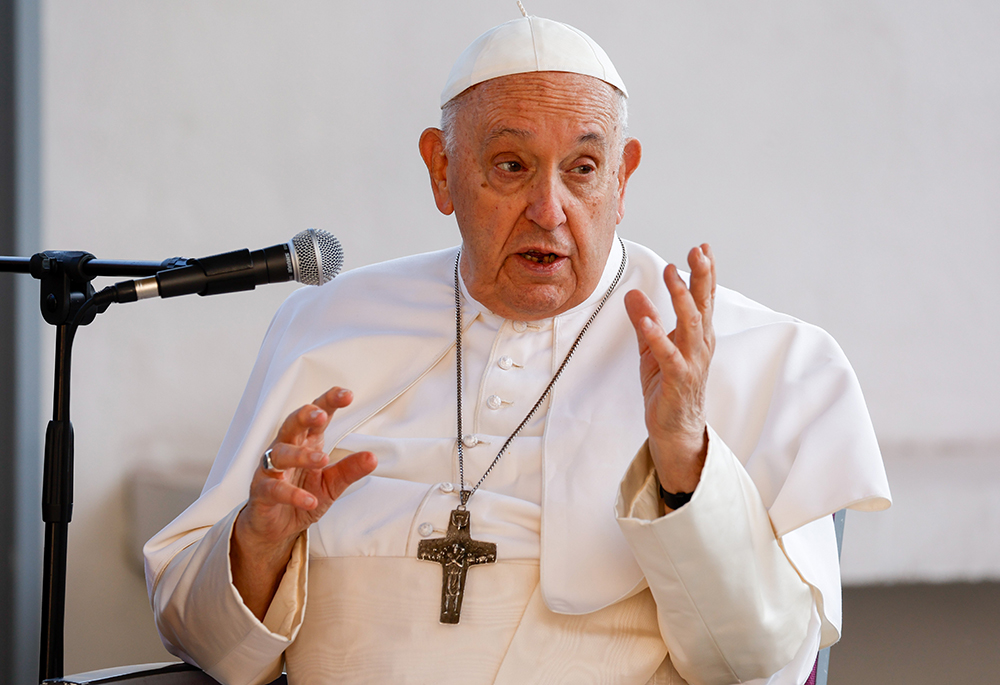
Pope Francis speaks to people who find themselves in a situation of economic hardship at the house of the Missionaries of Charity in Marseille, France, Sept. 23, 2023. Francis, formerly Argentine Cardinal Jorge Mario Bergoglio, died April 21, 2025, at age 88. (CNS/Lola Gomez)
Those labeled "traditionalists" because they resist reform, forget that the Catholic Church's tradition is itself a tradition of reform. People may cling to the Tridentine rite as the embodiment of anti-reform tradition, but the Council of Trent which gave us that rite was itself a great reforming council, even more than Vatican II. Trent changed almost everything about Catholic practice and worship, inventing seminaries, mandating bishops conduct pastoral visitations of their dioceses, limiting multiple benefices (payments for supervising particular churches), and, yes, creating a largely new, almost universal rite. I say "almost" because Trent permitted diverse rites, such as the Ambrosian liturgy in Milan, and the various Eastern-rite churches always preserved their distinctive rituals.
Those who are labeled "reformers" are reforming the tradition. They do not create new rituals or teachings out of whole, modern, cloth. One of the greatest reforms of the Second Vatican Council was the move away from an ecclesiology that saw the church as so transcendent as to be above history. Vatican II called for a church that is inculturated, acknowledging that the church lives and breathes in distinct historical moments. But, what are we inculturating, what is living in history, except our transcendent revelation in Jesus Christ?
Catholic is a word with a meaning. It means "everywhere" or "universal." That universality is not abstract: It is particular churches that, together, constitute the one Catholic Church. They are bound together by being in communion with each other and with the bishop of Rome, the pope. Instead of the politicized, ideological checklist, the defining characteristic of Catholicism is communion with each other, a relationship of fraternal affection and shared belief.
Put differently, the Gospel can come to fruition in every kind of heart: An African heart and a European heart, a liberal heart and a conservative heart, a traditionalist heart and a reforming heart.
Catholic is a word with a meaning. It means "everywhere" or "universal." That universality is not abstract: It is particular churches that, together, constitute the one Catholic Church.
The great "reforms" of Pope Francis' pontificate were twofold. First, he insisted that the church welcome everyone, that no one stand guard at the entrance to the church with a moral checklist, that we are all sinners in need of redemption. He refused to value one set of sins against another. Francis was vigorously opposed to abortion and to unfettered capitalism. Others may have been confused by his dining with transgender sex workers while also condemning gender ideology but he did not see any contradiction. His agenda was pastoral, not political.
The second great reform was synodality, an effort to get everyone in the church talking to one another and, more importantly, listening to one another. Synodality is the means for resolving tensions and for escaping from the temptation to reduce each other to caricatures. The means and the end were the same: listening to the Holy Spirit, active in the lives of all baptized Christians.
We may be stuck with labels drawn from the political world. But the cardinals who enter the conclave tomorrow (May 7) need to select a new pope who recognizes how those labels distort. They need to elect a pope who will, like Francis, adopt pastoral, not political, approaches to the problems of our time and embrace synodality as the best means for overcoming the tensions that will always exist in a worldwide communion. They need to find a pope who will continue to keep the Catholic Church catholic.




